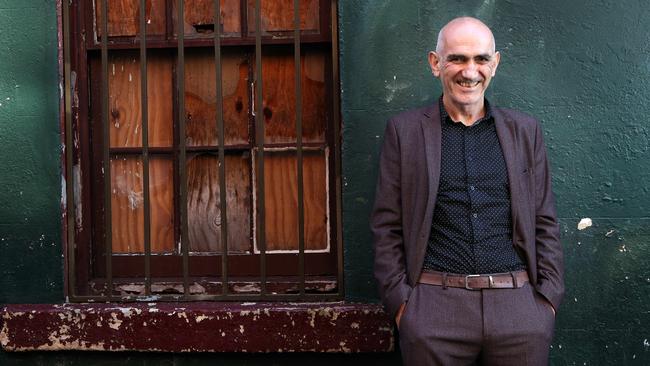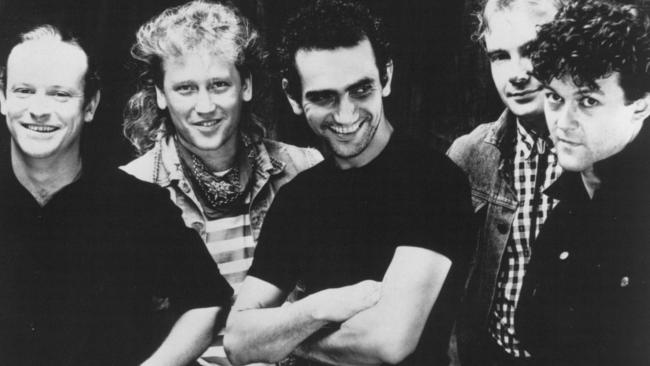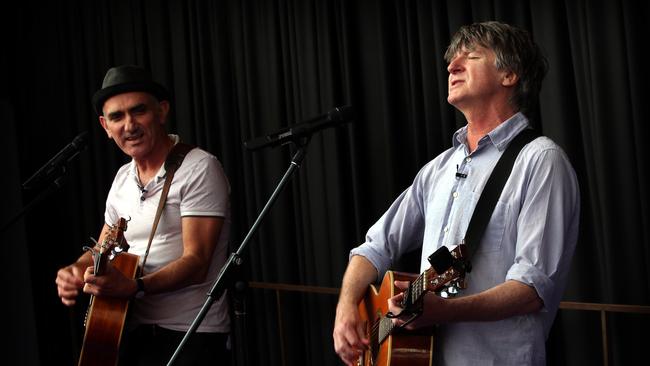Life is Fine for Paul Kelly: new stories of him
Collaborations with other artists have opened up new avenues for singer-songwriter Paul Kelly.

Paul Kelly, nursing a cup of tea in the kitchen of his record company’s offices in Sydney, is waxing lyrical about the trials of being a musician. “Hanging around and trying to get work and being put off or not paid and always struggling for money,” he says by way of explanation. Kelly can’t be short of a few bob, but then he’s not talking about himself. He’s retelling the on-the-road travails of Wolfgang Amadeus Mozart, for whom he has great admiration and whose letters, written as a struggling young muso, he has been poring over in the past few months.
“That has been very interesting in lots of ways,” he says of Mozart: A Life in Letters. “Generally he is writing when he is travelling; writing about being a travelling musician for hire, trying to get work at various courts of barons, dukes and duchesses, princes and princesses.”

It was ever thus for young musicians — the struggle at least, if not being at the mercy of nobility. Certainly Kelly, one of our most revered songwriters and performers for the past 30 or so years, did it tough early on, first in his home city of Adelaide, then in Melbourne and Sydney, as he found his feet as a songwriter, releasing albums such as Talk (1981) and Manila (1982) that did little to keep the wolf from the door.
Watch Paul Kelly in the studio as he records Firewood and Candles.
In 2017, however, things are good for the 62-year-old, Melbourne-based singer. Kelly’s output over the past 10 years, whether on record, in print or on stage, has been multifaceted, prolific and generally well received. His 2010 “mongrel memoir” How to Make Gravy set a new benchmark for Australian rock autobiographies, while in 2012 Ian Darling’s documentary Paul Kelly: Stories of Me provided further insight into the songwriter’s life and craft. In the same year Kelly released the stripped-back album Spring and Fall, a rewarding song cycle built around a love affair.

Since then there has been a national tour with likeminded tunesmith Neil Finn, a semi-classical album featuring the poetry of Les Murray and others, an album of Shakespeare sonnets set to music, a collection of songs to be played at funerals (recorded with guitarist Charlie Owen) and The Merri Soul Sessions, an album and tour of soul-based material featuring Kelly alongside the likes of Dan Sultan, Clairy Browne, Kira Puru and Vika and Linda Bull.
One might think Kelly had a fear of being idle, but he does find time to relax, whether it’s by reading a book, riding his bike or watching cricket. Yet all of those things also have a pivotal role to play in his life as a songwriter.
“I always think of (Go-Between) Grant McLennan in that way,” he says. “You’d go and visit Grant and he’d be lying in bed reading a book. Not many people lie in bed in the middle of the day and read a book without feeling a bit guilty. To him that was what he was — ‘This is what I do. I’m a reader and I’m a songwriter.’
“I’m often lying in bed reading a book on so-called writing days. To me that’s part of writing.”
This is partly how Kelly arrived at his latest venture, the new album Life is Fine. After his recent diversions into terrain esoteric and philosophical, this record, a decidedly chirpy affair by comparison, sees him return to the pop/rock stylings of his groundbreaking 80s albums Gossip, Under the Sun and So Much Water So Close to Home. There’s a warmth and easy chemistry on songs such as Firewood and Candles, Finally Something Good and Josephina, although a hint of Kelly melancholy creeps into Letter in the Rain and the title song.
“For one reason or another,” he says, “the last few records have been a bit obscure. I knew I wanted to make an upbeat record. I’d been putting songs aside until I had enough of them.”
Putting songs in compartments for use later has become an essential component of Kelly’s operations in his ever-expanding oeuvre — poems over there, short songs in there, band songs, as the ones on Life is Fine were labelled, over here. One can imagine a batch marked “happy” and another one “sad”, with “conflicted” somewhere in the middle, but it doesn’t work quite like that.
“I don’t sit down and write a bunch of happy songs or a bunch of sad songs,” he says. “They seem to just come out in different ways and then I sort them. That’s what’s different now. I jump around. I have a bunch of songs that are completely different to each other, so I just sort them. You get three or four and you think that’s the beginning of something and it gives you the impetus to add more. Then you get a stronger picture of what it’s going to be.”
■ ■ ■
Long before he put on a musician’s hat, the baggy green was the object of Kelly’s ambitions. Captain of the first Xl at Rostrevor College, a Christian Brothers school in Adelaide, he dreamed of one day having a Test career, or perhaps one in AFL, at which he also excelled. While that didn’t materialise, his love of cricket and football has never wavered. Watching cricket has also been instrumental in his music career, not least on his latest work.
Four of the songs on Life is Fine — Rising Moon, Firewood and Candles, Rock Out on the Sea and Leah: The Sequel — were co-written by Kelly and his mate Billy Miller, a Melbourne all-rounder muso (once of the Ferrets) who also co-wrote Don’t Let a Good Thing Go on The Merri Soul Sessions album. The two men like to hang out to watch cricket together on TV. During tea and lunch, they pick up guitars.
The first time, says Kelly, “he came over to watch a South Africa series. The day was rained out so we ended up just playing guitar. We started on a few songs and one of them was Don’t Let a Good Thing Go. We realised we had a good knack of writing together. He’s one of those guys who know every pop song ever written, just about. He’s really fun to play with and I think you can hear his influence. He pushed me to be a bit more poppy.”
Kelly has worked with a lot of musicians over the past 40 years. After making his band debut in Melbourne’s High Rise Bombers in the late 70s, his own bands in the formative parts of his career included the Dots and the Coloured Girls, later known as the Messengers — and since that group was disbanded in 1991, a floating roster of gun players under various collective names or under Kelly’s, largely from Melbourne, has passed in and out of the ranks.
Life is Fine was recorded in two blocks, in February 2016 and February this year. Each time Kelly assembled the core band from The Merri Soul Sessions album and tour in Melbourne’s Soundpark studios to work on new material. The rhythm section, drummer Peter Luscombe and bassist Bill McDonald, have been the most consistent Kelly sidekicks over the past 25 years, since they played on his first post-Messengers album, Wanted Man (1994). Guitarist Ash Naylor has been a regular in the touring line-up since 2006, alongside keyboards player Cameron Bruce.
The Bull sisters completed the Life is Fine line-up, while The Merri Soul Sessions engineer/producer Steve Schram was once again in the control room. The plan, as their leader explains, was to record a happy album, or one that his record company, EMI, might consider normal after his run of more esoteric expeditions.
“Shakespeare is considered serious, a bit highbrow, although I don’t think so,” he says. “Spring and Fall had again been a consciously mellow record, a pastoral record, with no bass and drums. I definitely felt I was due to make a loud record. Merri Souls did that but it had a cast of different singers, it didn’t fit the mould of this one.”
Yet there are other singers on Life is Fine too. Kelly has worked with Vika and Linda Bull regularly over the past 25 years and had a couple of songs he felt would suit their voices more than his own. My Man’s Got a Cold is an old-school, bawdy blues romp (“he’s off his wine and bread / he even said no to head”) that suits perfectly Vika Bull’s rich and powerful gospel tone, while Linda gives a sweeter reading of the sprightly country-ish tune Don’t Explain, an old song that Kelly has been trying to get a woman to sing for 25 years.
“I’m kicking myself that I didn’t think of it 30 years earlier,” he says of giving the lead vocal to other people.
“Lots of bands that I like have other singers sing a song, like the Velvet Underground or the Rolling Stones. It makes sense to me. They’re my songs and I like having another voice or two on the record. It’s a good little blueprint for other records down the track.”
■ ■ ■
The album title Life is Fine is a deliberately ambiguous one: on the one hand affirmative and on the other an interpretation of “fine” as a narrow thread, or, as Kelly puts it, “never knowing what’s around the corner”. What’s surprising is that the lyric to that song and its title aren’t Kelly’s. Life is Fine is a poem by American writer Langston Hughes, who died in 1967.
I went down to the river
I set down on the bank
I tried to think but I couldn’t
So I jumped in and sank.
I came up once and hollered!
I came up twice and cried!
If that water hadn’t a been so cold
I might’ve sunk and died.
A friend of the singer’s sent it to him a few years ago and he felt intuitively that it was a song lyric. It’s this employment of other people’s words, from the Bard to WB Yeats, that has become increasingly important to Kelly’s music, expanding his method of songwriting, which for the bulk of his career has involved writing the tunes first.
“What’s happened in the past four or five years is that I’ve got in the habit of putting poetry to music,” Kelly says, “so that’s like having another way to write songs.”
This modus operandi began with Conversations with Ghosts (2013), when Kelly and Perth composer James Ledger collaborated on musical settings for poems by Murray, Yeats, Tennyson and others. With musical assistance from recorder virtuoso Genevieve Lacey, the project opened up Kelly to a new way of working.
“Before that I’d never even thought about putting music to poetry,” he says. “My own way of writing is to start with music, with bits of words attached. I thought doing it with poetry would make it stiff or limited, but I was wrong about that.”
Kelly admits that this discovery has made his work a little easier. He may have written many a great lyric — How to Make Gravy, When I First Met Your Ma, They Thought I was Asleep — but he has always said that crafting great lines is the most difficult part of the job.
“Words are the slow part of writing songs for me, and the hardest,” he says. “So when you have the words, the job’s almost half done.”
So taken is he with this less arduous approach to songcraft that another project employing poetry is in the pipeline, although it won’t see the light until 2019. Last year Kelly was approached by Australian writer and pianist Anna Goldsworthy with the idea of creating a new work employing poetry.
“We’ve kicked some ideas around and narrowed it down to poems about birds, or flying things,” he says. “So we’re gathering poems about birds. There are lots of great ones.” Work will commence on that one next year.
Before then, starting in September, Kelly and his tight-knit ensemble set off on an extensive world tour, taking in Britain, Ireland, Europe, the US and Canada before a trip across Australia in November.
Maybe after that he’ll find some time to read a book, or go for a long walk and come up with a great idea for his next project.
“A songwriter needs to have free time,” he says. “That’s the only way to get songs.
“I don’t think I think big thoughts on walks, but I think going on walks or swims, or riding my bike … it’s about getting away from writing or working. It’ll jog things loose that might not otherwise get jogged.”
Paul Kelly’s album Life is Fine is out through EMI.
